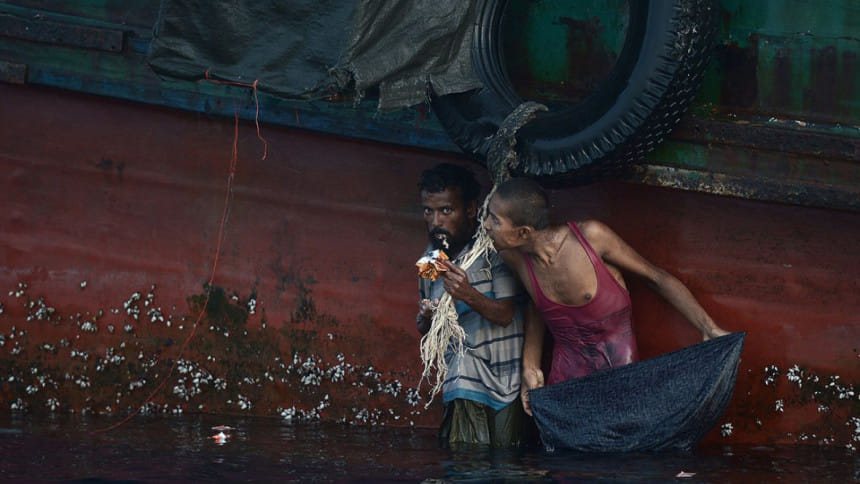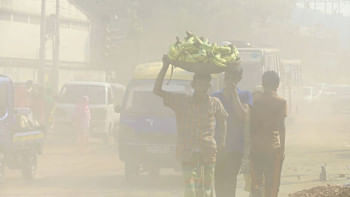Boatloads of human misery

For full two weeks or thereabouts in April the media in the west, particularly the US, were ablaze with news of hundreds of migrants drowning in the Mediterranean while attempting to cross illegally to European shores. These were people fleeing war torn areas of Syria, and other African countries desperate to land in any country that would give them asylum. They were in boats that were hardly meant to carry passengers, but these desperate people who were packed like sardines did not care how risky their journey would be. All they cared was the hope for a place safer than their wretched countries and equally woeful existence. Among those who survived was a Bangladeshi who had thrown himself into this hapless lot, but luckily escaped death. I did not follow his plight as this was not reported in the press, but I guess he was handed over by local authorities to our diplomatic mission in Spain.
Refugees fleeing from war torn or famine stricken areas to neighbouring countries or even further is easily understandable. Syria as we know is no place for normal living with a civil war going on for last three years and the country fractured into parts, some of which are under control of a draconian military force. Flight of refugees from Africa is a phenomenon that has been ongoing since a large number of countries in that continent went from one conflict to another, and humans were disposed of like animals in those conflicts. What bogs the mind is when people from countries that are purportedly stable seek such desperate means as crossing the seas in dangerous vessels, all in the hope of making it to a liveable place.
The Bangladeshi survivor of the Mediterranean ship wreck is a small example of the desperation of our own nationals to leave their country in search of a better existence. There have been many more like him who have tried, some successfully, to take a life threatening journey across the continents to earn a living. But the story of the thousands now hitting the headlines who have been caught between life and death on the high seas of South East Asia is at a different level. Although a large number are reportedly refugees from Myanmar, the Rohingyas, the rest are from Bangladesh—good and proper.
And this takes us to the nub of the problem. The flight of the Rohingyas is understandable as in the case of Syrians or Africans leaving a war zone. The Rohingyas are not accepted as citizens in their own country, and they have been hounded for years. For them any place is better than their home because they cannot call their country as home. They will go to any lengths, take any risk, and take whatever course they can to leave their country. What is the driver taking such life threatening risks for the people who have a country, and most likely a home? Is it the lure of higher income, better living, or just simply a more secure life?
We know that the lure of higher income and living standards are the traditional attractions for people leaving for industrialised or oil rich countries. Our people go to extraordinary lengths to go to countries in Middle East and Europe, and perhaps Malaysia. They pay hundreds of thousands to brokers who arrange their employment and travel. But who would like to board a rickety fishing vessel and leave for unknown destinations knowing that this could be their final journey?
The story of hundreds of people, mostly of Bangladesh origin, now marooned in the high seas of Indonesia and Malaysia should be in the conscience of the countries adjoining the seas, but most importantly of Bangladesh. It is possible that the current floating people would be rescued and given some temporary shelter. It is also possible that some, notably the Rohingyas, may get asylum. But the remaining Bangladeshis will be repatriated. They may like it or may not, but at least they will not die like those hundreds who reportedly died in the jungles of Thailand earlier. But will these stop future flights of desperate Bangladeshis?
There are now attempts by the government to track human traffickers and arraign them before law. Human traffickers exist and do their business because there are clients who are desperate to leave their country. And why do they want to leave the country? It is not always a better employment opportunity or higher income; it is also because there is no employment in the country where he lives. It is also because there is no way to have a subsistence income.
In Bangladesh we live in a paradoxical society. In one hand we have impressive statistics that show a growing national income, steadily rising exports, and impressive flow of foreign earnings. What these statistics do not show are the pathetic state of our rural economy, rising unemployment of rural youth, and growing disparity of rural and urban income. Our planners spend time more on industrialisation and supply of energy for industry and less on erasing the menace of rural poverty and the desperation of our unemployed youth. Stopping a few human traffickers from doing their business will not stem the flow of desperate people seeking desperate means to leave the country. If we really mean business we have to focus our planning and strategy on employment and income opportunities of our rural mass.
The writer is a political analyst and commentator.

 For all latest news, follow The Daily Star's Google News channel.
For all latest news, follow The Daily Star's Google News channel. 



Comments